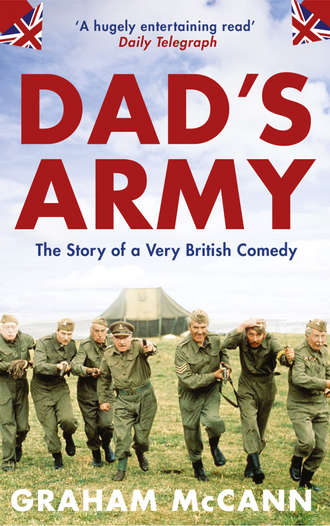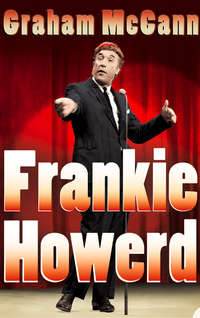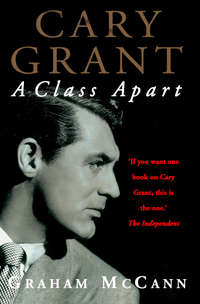
Полная версия
Dad’s Army: The Story of a Very British Comedy

Dad’s Army
The Story of a Very British Comedy
Graham McCann

Copyright
Fourth Estate
A Division of HarperCollinsPublishers 1 London Bridge Street London SE1 9GF
www.harpercollins.co.uk
This edition first published in 2002
First published in Great Britain in 2001
Copyright © Graham McCann 2001
The right of Graham McCann to be identified as the author of this work has been asserted by him in accordance with the Copyright, Designs and Patents Act 1988.
A catalogue record for this book is available from the British Library.
All rights reserved under International and Pan-American Copyright Conventions. By payment of the required fees, you have been granted the nonexclusive, nontransferable right to access and read the text of this e-book on-screen. No part of this text may be reproduced, transmitted, downloaded, decompiled, reverse engineered, or stored in or introduced into any information storage and retrieval system, in any form or by any means, whether electronic or mechanical, now known or hereinafter invented, without the express written permission of HarperCollins e-books.

Source ISBN: 9781841153094
Ebook Edition © OCTOBER 2012 ISBN 9780007389421
Version: 2015-12-16
HarperCollinsPublishers has made every reasonable effort to ensure that any picture content and written content in this ebook has been included or removed in accordance with the contractual and technological constraints in operation at the time of publication.
Dedication
For my mother, and in memory of Dick Geary
Epigraph
Love and celebrationare matchless foundationsfor programme-making,given there is skill as well.
HUW WHELDON
Contents
Cover
Title Page
Copyright
Dedication
Epigraph
PROLOGUE
PART ONE: THE SITUATION
I A Peculiar Race
II A Cunning Plan
III You Will Be Watching …
PART TWO: THE COMEDY
IV The Pilot
V Series One
VI Success
PART THREE: THE CHARACTERS
VII An Officer and a Gentleman
VIII A Scot, a Spiv and a Stupid Boy
IX The Old Fools
PART FOUR: THE COMPANY
X Thetford
XI Shepperton
XII Shaftesbury Avenue
PART FIVE: THE CLASSIC
XIII The Nation’s Favourite
XIV Never Too Old?
XV Revival
EPILOGUE
Episode Guide
Bibliography
Index
Acknowledgements
Notes
About the Author
By the Same Author
About the Publisher
PROLOGUE
This is my country
These are my people
This is the world I understand
This is my country
These are my people
And I know ’em like the back of my own hand.
RANDY NEWMAN1
Humour is not a mood but a way of looking at the world.So if it is correct to say that humour was stamped out inNazi Germany, that does not mean that people were notin good spirits, or anything of that sort, but something muchdeeper and more important.
LUDWIG WITTGENSTEIN2
Even our jokes have walls and hedges round them.
J. B. PRIESTLEY3
You must remember this: a small church hall, somewhere in England, sometime during the Second World War. To the left, perched high on top of a wobbly wooden stepladder, is a fresh-faced, fragile-looking youth, folded over a tommy-gun, primed and poised to pounce. To the right, seated behind a rickety card table, is a wiry, wily old campaigner, leaning over a Lewis gun, all set to snap and strike. At the centre, shiny toe to shiny toe, stand a short, stout Englishman and a tall, thin German.
The German has just announced that he has added the Englishman’s name to the ominously long list of those who, once the war has been won, will be brought to account for their actions. The Englishman has just replied that, since the Germans are never going to win this war, he can put down whichever names that he wishes. It is at this point that the fresh-faced youth on the ladder elects to interject:
Whistle while you work.
Hitler is a twerp.
He’s half barmy,
So’s his army.
Whistle while you –
‘Your name will also go on the list!’ exclaims the German. ‘What is it?’ ‘Don’t tell him, Pike!’ orders the Englishman.
‘Don’t tell him, Pike!’ What a beautiful comic line, patently apt yet palpably absurd, so funny for being so true. It encapsulates not only the kind of qualities – brightness, decisiveness and bravery – we tend to associate with our best self, but also those – foolishness, fearfulness and frailty – that we tend to associate with our worst. It makes us laugh so much because we laugh most unaffectedly at what we know most about, and what we know most about is ourselves: each of us, at some point or other in our life, has said or done something equally as apt and equally as absurd as ‘Don’t tell him, Pike!’
It is really no wonder then that this scene has been hailed by some as the funniest moment in the history of British television,4 nor that the show in which it featured has come to be recognised as one of this medium’s most treasurable achievements.5 We do not warm to just any old thing that the small screen serves up to us; for all of the hours, days, months and even years of television that we watch in the course of a lifetime, we actually remember very little, and cherish even less. We tend to recall and respect only those few programmes which try neither to be momentous nor mundane, but which simply try, right here, right now, to engage our minds and our moods.
Dad’s Army was just such a programme. It ran for nine years – from the summer of 1968 to the winter of 1977, stretching out over nine series and eighty episodes – and has continued to be a frequently repeated favourite ever since. Its extraordinary appeal, in terms both of breadth and of depth, has remained remarkably solid over the years. For example, the episode entitled ‘The Deadly Attachment’ (which featured that ‘Don’t tell him, Pike!’ line) attracted an estimated audience of 12,928,000 when it was first broadcast on BBC1 back in 1973; when, the following year, it received its initial repeat, 10,908,000 people tuned in to see it, as did 9,082,800 for the second repeat in 1978 and 10,600,000 for the third in 1989.6 Such rare and special constancy has little to do with any clinging need for nostalgia:7 among the programme’s most devoted admirers are some of those who would prefer to forget the war, as well as some of those who are not able to recall it. Dad’s Army’s lasting appeal has a great deal to do with an unquenchable craving for quality.
Dad’s Army, as a television programme, was something special. It stood out back then, when television’s aim was to entertain a nation, and it stands out even more prominently now, when the intention is merely to indulge a niche. It was – it is – an exceptional piece of programme-making. Every element epitomised the unshakeable commitment to excellence: the gloriously apposite theme song, a flawless recreation of the sound of wartime defiance; the well-chosen setting, animated by the meticulously assembled authenticating detail; the quietly effective style of direction, focusing our attention on the action rather than the art; and, at the very heart of it all, the consistently fine acting and writing which combined to cultivate a set of characterisations that audiences came not only to laugh at but also to live with and love.
The comedy that comes from character, observed J. B. Priestley, is ‘the richest and wisest kind of humour, sweetening and mellowing life for us’.8 Context can supply the catalyst for the comedy, but only characters can supply the raison d’être. ‘The humour of incident and situation that does not proceed from character, however artfully it may be contrived, is at best,’ argued Priestley, ‘only an elaborate play, making a glitter and commotion on the surface of things. But the humour of character goes down and touches, surely but tenderly, the very roots of our common human nature.’9
Not everyone who has watched Dad’s Army will have known much, if anything, about the last world war, or the history of the Home Guard, or life in early 1940s England, but everyone, surely, will have known someone like the portly, pushy, pompous little provincial bank manager and platoon commander, George Mainwaring (‘Oh, they’ll know by the tone of my voice that I’m in charge …’), or his sleepily urbane and vaguely insouciant chief clerk and sergeant, Arthur Wilson (‘Would you all mind falling into three ranks, please? Just as quickly as you can, in three nice, neat lines. That would be absolutely lovely, thank you so much’). Most, if not all of us, will have known someone very much like the indomitably doughty but somewhat over-excitable local butcher and lance corporal, Jack Jones (‘Get help? Right ho, sir! Don’t panic! Don’t panic!’), or the sly and saturnine Scot, undertaker and part-time private, James Frazer (‘I knew it: we’re doomed. Doomed, I tell ye!’), or the frail, permanently fatigued former gentleman’s outfitter and conscientious dispenser of bicarbonate of soda, Charles Godfrey (‘Do you think I could possibly be excused, sir?’), or the sharp, street-smart spiv Joe Walker (‘’Old on a minute – I said they were difficult to get, I didn’t say impossible!’), or the mollycoddled, maladroit and callow clerk and combatant, Frank Pike (‘Uncle Arthur, if you don’t let me up on that bunk I’ll tell Mum!’), or the vulgar and obstreperous greengrocer and chief air raid warden, Bill Hodges (‘Ruddy ’ooligans!’), or the camply effete Anglican vicar, Timothy Farthing (‘I must say, you’re a much braver man than I am’) and his fawning, flat-capped verger, Maurice Yeatman (‘Ah, well, there’s all sorts of courage, your Reverence – I don’t know how you have the nerve to get up and give those sermons every Sunday’). Dad’s Army, deep down, was not really about the war. It was about England. It was about us.
It was about our amateurism (‘I think we can quite happily say that Jerry’s parachutists will be as dead as mutton from Stead & Simpson’s to Timothy White’s. We’d get a clear run down to the Pier Pavilion if that blasted woman would get out of the telephone box!’), our faith in good form (‘Break the glass? Have you lost your senses? We’re not savages, you know! We’re a well-trained British army of sportsmen!’), our willingness to help out (‘I’d be delighted to oblige in any capacity that doesn’t involve too much running about’), our reluctance to be regimented (‘I’m afraid I’m just not awfully good at strutting and swaggering’), our cosy eccentricities (‘I’m so sorry my sister Dolly couldn’t come tonight – she’s got a touch of rheumatism – but she sent you some of her upside-down cakes’), our irrepressible playfulness (‘We’ll do “Underneath The Spreading Chestnut Tree”! Sergeant Wilson will do the cheerful actions, and we’ll follow’), our loyalty (‘I’d go through fire, and brimstone, and, and, treacle for you, sir!’), our caution (‘Do you really think that’s wise?’), our courage (‘They could put twenty bombs down my trousers and they will not make me crack!’), our deep-rooted distrust of outsiders (‘Damned foreigners! They come over here and then have the cheek to fire at us!’), and, most of all, it was about our chronic consciousness of class.10
Class provided the grit that made this pearl. As Dennis Potter put it:
Dad’s Army is made possible by the extended joke which allows the British, or more specifically the English, to turn every possible encounter into a subtle joust about status. There is as much drama swilling about in our casual ‘good mornings’ as in the whole of Il Trovatore, and more armour-plating on a foot of suburban privet than in the latest Nato tanks … [Dad’s Army] is a conspiracy of manners between the loving caricatures in crumpled khaki and the complicit delight of an audience which likes pips as well as chips on its shoulders.11
There, on one side of the desk, sits the middle-class, grammar school-educated George Mainwaring, an overachiever desperate to seize the day, and there, on the other side, sits the upper-class, public school-educated Arthur Wilson, an underachiever content to cast a lazily discerning eye over each approaching day and remark on how perfectly lovely it looks before allowing it to amble idly by. There, between them, sparks and fizzes every kind of subtle slight, scornful sniff and furtive little dig that one class can direct at another without risking the ignition of outright civil war:
MAINWARING No question about it at all. It’s the families that make the trouble. I had to contend with all sorts of snobbish rubbish when I married Elizabeth. WILSON (smiling mischievously) Did you, er, did you, as it were, ‘marry beneath you’? MAINWARING Oh, no, no! The family rather thought that she did. She was very well-connected, you know, Elizabeth. Her father was the suffragan Bishop of Clagthorpe. WILSON (in mock awe) Was he really! MAINWARING Led a very sheltered life, you know, Elizabeth. (chuckles to himself) Do you know, she hadn’t even tried tomato sauce before she met me? Ah, I soon put that right! WILSON (sarcastically) You know, marrying you must have opened up a whole new world to her. MAINWARING Oh, yes, I think it did. But I never felt at ease with her parents, you know. Always got the impression they were looking down their noses at me. This was even after I’d become Assistant Manager. WILSON Weren’t they impressed by that? MAINWARING Oh, not a bit. It was quite a big branch, too, you know. I had my own partitioned cubicle. WILSON Ooh! Did you?12George Orwell, who was an active member of the real-life Home Guard, likened England to ‘a family with the wrong members in control’.13 In wartime Walmington-on-Sea, the wrong members are recruited from Wilson’s side of the family, but Mainwaring continues to harbour the hope that one day the wrong members will arise from his side. There is, in the meantime, an uneasy truce, with both sides trapped in the same small, neat and nosy seaside town, the same tiny tumbledown church hall, the same ageing bodies, the same sobering predicament. ‘Still,’ as Orwell added, ‘it is a family. It has its private language and its common memories, and at the approach of an enemy it closes its ranks.’14
Any vision of England is bound to be partial. The vision of England projected by Dad’s Army is England at its kindest, gentlest and most decent. This is the England that George Santayana hailed as ‘the paradise of individuality, eccentricity, heresy, anomalies, hobbies, and humors’,15 the England that Emerson respected for its ability to ‘see a little better on a cloudy day’,16 the England that Arnold Bennett cherished for its ‘powerful simplicity’,17 the England that Orwell loved for the fact that the most stirring battle-poem in its history ‘is about a brigade of cavalry which charged in the wrong direction’.18 This is the England in which one can find oneself saying, with the very best of intentions, something as silly as ‘Don’t tell him, Pike!’ Few partial visions seem quite as familiar as this, and fewer still seem quite as appealing.
Dad’s Army encouraged the nation to laugh at itself, and that, as services go, is one of the most precious that any nation can receive. It does not deserve to be remembered merely as an extremely popular situation-comedy, nor as an admirable piece of light entertainment, nor as an ever-reliable ratings winner. It deserves to be treated with a little more respect, a little more care, than that. It deserves to be remembered as a truly great television programme, a fine example of what Huw Wheldon once described so well as ‘good programmes made for good purposes by good people doing their best and doing it well’.19
THE SITUATION
The day war broke out, my missus looked at me and she said: ‘What good are yer?’ I said: ‘How d’you mean, what good am I?’ ‘Well,’ she said, ‘you’re too old for the Army, you couldn’t get into the Navy and they wouldn’t have you in the Air Force, so … what good are yer?’ I said: ‘I’ll do something.’ She said: ‘What?’ I said: ‘How do I know? I’ll have to think.’ She said: ‘I don’t see how THAT’s going to help you – you’ve never done it before … So, what good are yer?’ I said: ‘Don’t keep saying what good am I!’
ROBB WILTON1
CHAPTER I A Peculiar Race
I think it’s true to say that at the present time this country of ours, because of its courage and its proud defiance, its determination to put an end to this international brigandage and racketeering of the Hitlers and Mussolinis and their riff-raff is the hope of all that is best in the world, which watches us with admiration.
J. B. PRIESTLEY1
MAINWARING You can’t win this war! See the sort of men that this country breeds? U-BOAT CAPTAIN Rather stupid ones.DAD’S ARMY2
It all began, in a way, one day back in the summer of 1940. Shortly after nine o’clock on the evening of Tuesday, 14 May, Anthony Eden, Great Britain’s newly-appointed Secretary of State for War, began his broadcast to the nation on the BBC’s Home Service:
I want to speak to you tonight about the form of warfare which the Germans have been employing so extensively against Holland and Belgium – namely the dropping of troops by parachute behind the main defensive lines … [I]n order to leave nothing to chance, and to supplement from sources as yet untapped the means of defence already arranged, we are going to ask you to help us in a manner in which I know will be welcome to thousands of you. Since the war began the government have received countless inquiries from all over the Kingdom from men of all ages who are for one reason or another not at present engaged in military service, and who wish to do something for the defence of their country. Well, now is your opportunity.
We want large numbers of such men in Great Britain, who are British subjects, between the ages of seventeen and sixty-five, to come forward now and offer their services in order to make assurance [that an invasion will be repelled] doubly sure. The name of the new Force which is now to be raised will be ‘The Local Defence Volunteers’. This name describes its duties in three words … This is … a spare-time job, so there will be no need for any volunteer to abandon his present occupation … When on duty you will form part of the armed forces … You will not be paid, but you will receive uniform and will be armed … In order to volunteer, what you have to do is to give in your name at your local police station and then, as and when we want you, we will let you know … Here, then, is the opportunity for which so many of you have been waiting. Your loyal help, added to the arrangements which already exist, will make and keep our country safe.3
Now there could be no turning back: eight months into the war, and four days after the commencement of Germany’s offensive in the West, Britain was set to launch the largest, most quixotic and, in a way, least militaristic volunteer army in its history.4
The government, in truth, had never been keen on its formation, believing, to begin with, that such a force would find itself with far too little to do, and then later fearing that it might find itself trying to do far too much. There was one prominent political figure, however, who had supported the idea right from the start: Winston Churchill. On 8 October 1939, Churchill – then newly installed as First Lord of the Admiralty – had written to Sir Samuel Hoare, the Lord Privy Seal, with a proposal:
Why do we not form a Home Guard of half-a-million men over forty (if they like to volunteer) and put all our elder stars at the head and in the structure of these new formations? Let these five hundred thousand men come along and push the young and active out of all their home billets. If uniforms are lacking, a brassard would suffice, and I am assured there are plenty of rifles at any rate.5
Nothing came of the suggestion, however, as the military’s chiefs of staff were of the opinion that any danger of invasion or raids was slight so long as sufficient naval and air forces were guarding the sea approaches to Britain, and, as all of the belligerents settled into the six-month stalemate that came to be known as the ‘Phoney War’,6 it seemed as if Churchill’s notion of an army of ageing amateurs had been left to die a quiet death. Then, quite suddenly, things changed: on 9 April 1940, the Allies were startled by the first in a series of sudden and strikingly effective enemy thrusts when German units moved in to occupy Denmark and Norway; barely a month later, as the Allies were still struggling to come up with a suitable response to the events in Scandinavia, the main offensive began in earnest when Germany took control of both The Netherlands and Belgium. These developments transformed the public mood; now that it appeared possible that most, if not all, of the Channel coastline might soon be under German occupation, the prospect of England being invaded suddenly seemed startlingly real.
Anxiety swiftly took the place of apathy. There were fears of a fifth column, and fears of airborne landings. Facts may have been scarce but there was an abundance of rumours, and soon newspapers were full of speculation regarding the possibility that enemy agents were already operating inside the nation. The intelligence division of the Ministry of Information, which had been set up to monitor civilian opinion and morale, noted that such talk of espionage and sabotage was causing widespread unease, and ‘the situation in a few places has become slightly hysterical’.7 The prospect of parachute landings was, if anything, the source of even greater anxiety. The Home Office distributed a distinctly unsettling circular to the public informing them that ‘German parachutists may land disguised as British policemen and Air Raid Wardens’,8 and The Times ran a sobering editorial warning its readers that these enemy paratroopers ‘might speak English quite well. Some might be sent over in civilian dress to act as spies. The general public must be alert.’9





